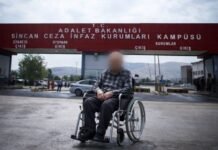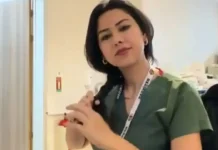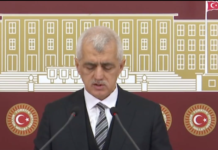Abdülaziz Örpek, 46, an inmate who has suffered from thyroid cancer for the past two years, is unable to receive treatment in prison, and his pleas for release to seek medical treatment on the outside have gone unanswered by authorities, Bold Medya reported.
Örpek was arrested in December 2019. According to his wife Ayşegül Karaturgut he was scheduled for surgery in February, but it was cancelled after his arrest. “He had routine doctor appointments every three months, but these were also cancelled,” she said. “The doctor said unless my husband had surgery, there was a great risk the cancer would spread.”
Karaturgut added that Örpek had additional health problems including heart disease and hypertension. She said she was also diagnosed with cancer five years ago, “I am suffering from ovarian cancer at home, and he is suffering from cancer in prison. We have an 8-year-old daughter. They could at least release him into house arrest.”
Örpek was working for Turkey’s Housing Development Administration (TOKİ) in the southeastern province of Van, where he was arrested for smuggling drugs and sentenced to 17 years, six months in prison.
According to the Human Rights Association (İHD), there are currently 1,605 sick prisoners in Turkish prisons, 604 of whom are critically ill. Although most of the seriously ill patients have forensic and medical reports deeming them unfit to remain in prison, they are not released, with authorities claiming they pose a danger to society. In the first eight months of 2020 five critically ill prisoners passed away because they were not released in time to receive proper medical treatment.
Ömer Faruk Gergerlioğlu, pro-Kurdish Peoples’ Democratic Party (HDP) deputy and rights activist, depicted the deaths of critically ill prisoners in Turkey who are not released in time to receive proper medical treatment as acts of “murder” committed by the state.
“They refuse to release the prisoners until it gets to the point of no return. They only release the prisoners when they realize they will die soon, not wanting them to die in prison,” Gergerlioğlu said.















